 I’m delighted to be the final stop on author Olivia Longueville’s book/blog tour for her Anne Boleyn alternative history novel Between Two Kings: A Novel of Anne Boleyn. Today I am ‘grilling’ Olivia with a few question.
I’m delighted to be the final stop on author Olivia Longueville’s book/blog tour for her Anne Boleyn alternative history novel Between Two Kings: A Novel of Anne Boleyn. Today I am ‘grilling’ Olivia with a few question.
By the way, MadeGlobal Publishing is offering a paperback copy of Between Two King to one lucky Anne Boleyn Files visitor. To be in with a chance of winning, all you have to do is comment below this post saying what ending you’d give Anne Boleyn if you wrote an alternative history of her life. Comment by midnight Friday 22nd January. One comment will be picked at random and the winner contacted by email. Good luck!
How did you first become interested in Anne Boleyn’s story?
My interest in Tudor England and the Tudor dynasty was awakened by the movie Anne of the Thousand Days, which I watched with my mother when I was in high school. I was hooked from the start, fascinated by Geneviève Bujold, who starred as Anne Boleyn. Her petite size and dark charm created an air of fragility about her, although her demeanour, energy, and actions painted her as a strong, wilful, and intelligent woman. Bujold created an exquisite amalgamation of steel and passion, and I think that she was an ideal choice of the role of Anne in this movie. Later, I fell in love with Natalie Dormer as Anne in Showtime’s The Tudors.
Watching that movie for the first time, I was filled with trepidation and exhilaration: would Anne give Henry a son? I remember sitting in front of the screen and trembling all over as I anxiously wondered whether Henry would spare Anne’s life after her arrest. My heart was seized with fear when the king screamed: “She cannot give me a living son! Very well then, if she cannot give me a male heir, I shall rid myself of her!” Tears were trickling down my cheeks when Anne climbed to the scaffold, and my heart was broken when she died at the hands of a French swordsman.
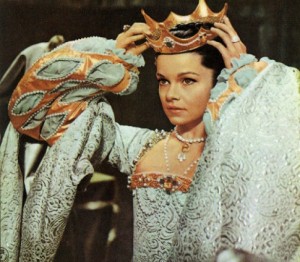
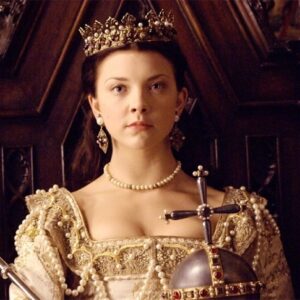
This is how my interest in Anne Boleyn was born. I began to devour historical books about the Tudors, Henry VIII, and Anne Boleyn. Over time, I realized that the movie wasn’t historically accurate and that the real Anne might have been different from Bujold’s portrayal. The discovery that the life and image of the real Anne Boleyn were shrouded in the mist of mystery made me eager to research Anne’s life. Anne’s story is a tragedy set against the backdrop of increasing danger and unfolding intrigues, and I’ve always loved tragedy more than romance or any other genre in literature. That’s why I have always gravitated towards Anne more than any of Henry’s other wives.
What made you write an alternative history novel rather than a “normal” one?
I love “normal” history, but I often feel an overwhelming compulsion to re-imagine history. What if certain events had never happened? How would history have been altered if events had unfolded in a different way? It is a real challenge to imagine the consequences of such alterations, but it is even more challenging to write this “alternate world”. If you like imagining alternate historical outcomes, you will definitely like reading and writing them too, which is my case.
When Anne caught the king’s eye, she rejected his advances, but it wasn’t a ruse to inflame his passion: being a pious woman, she behaved in this manner because she didn’t want to give her maidenhead to a lover, especially a king who would discard her as soon as he became bored with her. This is what King Henry had done to her sister, Mary. Of course, Anne was an ambitious woman who could be cruel to her enemies, and I have no doubt that she wanted to be queen, but I like thinking that, with all her faults, Anne was not a calculating seductress who craved only the crown.
Anne Boleyn was a tragic queen who died on trumped-up charges of adultery, incest, and high treason. This wronged queen deserved a much better end than being murdered by her own homicidal husband in his quest for a male heir, which is why I chose to re-imagine Anne’s story and write an alternate history novel.
How did you go about researching your novel? What resources did you use?
A historical fiction writer doesn’t just research history – they research a real world and then filter the results to fit a story. To write a good alternate history novel requires changing the actual course of history from a certain moment, and a writer has to rigorously research the time period in order to understand the implications of the twists and turns of their story within the framework of the true historical timeline. The author must take special care to keep their story plausible and logical. It’s difficult, but not impossible.
I’m passionate about historical research and genealogy, and I’ve read many works written by well-known scholars. I bought many books, spent much time in libraries, and did a lot of online reading as I researched the history of the Valois dynasty, the French Renaissance, the Tudors, and the Plantagenets.
Many years ago, I was drawn into the world of Valois and Tudor ancestor hunting. It was thrilling to trace my family back through my great-grandparents – both paternal and maternal – and beyond. My research into English and French history became even more meaningful to me.
Even though my novel is about re-imagining history, I still tried to portray Anne Boleyn, King Henry VIII, King François I of France, and other characters as close to historical reality as I could.
I’m in awe of you writing a novel in a language that’s not your mother tongue – how difficult was that? What problems/challenges did you encounter?
My relative comfort with the English language made it natural for me to write my novel in English. Reading many historical fiction novels and studying writing styles enriched my vocabulary, which greatly helped me in my own writings. Yet, sometimes I knew what word I wanted to use in my mother tongue and several other languages I speak, but I couldn’t immediately remember the equivalent word in English. This occasionally slowed my writing.
My mother tongue is intensely lyrical, and a sentence can go on and on, becoming really long. However, in English, it’s not advisable to create very long sentences, simultaneously making them properly structured and grammatically correct. The more you practise writing in a foreign language, the more comfortable you feel with it.
What is your view of Anne Boleyn’s fall? Who do you believe was responsible for it?
Henry VIII ordered Anne’s death, but we don’t know for certain whether he himself believed in her adultery. It is possible that Cromwell, who became Anne’s enemy, fed Henry lies about her and fabricated charges against her; after all, he led the interrogation of all the witnesses, and it was easy for him to collect the necessary proof of her guilt. But it is difficult for me to believe that Henry was such an utter fool that he couldn’t differentiate between lies and truth, and I don’t rule out the possibility that he personally commanded Cromwell to get rid of Anne no matter the cost. We don’t know for certain where Henry VIII fits into the conspiracy against Anne.
If Henry truly believed that she had betrayed him with her alleged paramours, then he considered her a traitor to England and to him – such a selfish and narcissistic man as Henry wouldn’t have ever forgiven her. If Henry assigned Cromwell the task of finding a way out of his marriage, and if he didn’t realize how far his chief minister would go to satisfy his liege’s whims, then Henry might have been amazed to learn about Anne’s adultery, but after her arrest he wouldn’t have changed anything because it was already too late, and he was so close to obtaining his freedom. Unfortunately, there is a chance that Henry knew about Anne’s innocence and patiently waited for her execution.
Regardless of whether Henry believed the accusations, or whether he planned her downfall, Anne had no chance to survive – her failure to bear a healthy son doomed her.
What are you working on at the moment and what are your writing plans for the future?
Currently, I am working on the sequel to “Between Two Kings”. The title of the sequel is “Queen’s Revenge.” My dream is to create the Anne Boleyn alternate history collection, and I am going to see my dream come true.
Which other historical characters interest you?
As I am very passionate about Tudor England, and there are many historical personalities who fascinate me. Among them, I am particularly fond of Henry VII and Elizabeth of York, one of the few royal couples who, to the best of my knowledge, found genuine happiness in their marriage. There are many outrageous myths surrounding their marriage, like the one that he kept her impoverished and raped her on their wedding night, but research shows that this is not true. I’m thinking of writing a novel about Henry and Elizabeth after finishing my alternate history series about Anne.
Which other historical character would you like to give an alternative ending?
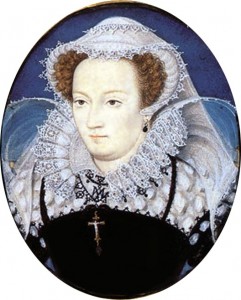 I would like to give an alternative ending to the conflict between Elizabeth I of England and Mary, Queen of Scots. Mary had such a bright future in France, but everything went terribly wrong for her after the death of her first husband, King François II of France, and eventually she lost all her kingdoms. Even though Mary spent many years imprisoned in England, she continued to pose an imminent threat to Elizabeth: she was a staunch Catholic with a strong claim to the throne, she had many powerful Catholic supporters (including Philippe II of Spain and the pope), and she herself could have been involved in the plots against Elizabeth.
I would like to give an alternative ending to the conflict between Elizabeth I of England and Mary, Queen of Scots. Mary had such a bright future in France, but everything went terribly wrong for her after the death of her first husband, King François II of France, and eventually she lost all her kingdoms. Even though Mary spent many years imprisoned in England, she continued to pose an imminent threat to Elizabeth: she was a staunch Catholic with a strong claim to the throne, she had many powerful Catholic supporters (including Philippe II of Spain and the pope), and she herself could have been involved in the plots against Elizabeth.
I believe that Elizabeth might have hesitated to have Mary executed, but she would have gotten rid of her troublesome cousin in the end; it was just a matter of time. When I look at these two cousins, various what-if scenarios begin to form in my head, for I feel sympathetic to both of them and wish there was another way to cut this Gordian knot.
What’s your favourite historical novel?
Notre-Dame de Paris by Victor Hugo, my favourite novel since my early youth, is set amid the pageantry of medieval Paris; it is a tragic romance that is brimming with intrigue, deceit, violence, and danger.
The story of Quasimodo, the deformed bell-ringer of the Notre Dame Cathedral, and the young, beautiful gypsy Esmeralda is a heartrending tale of unrequited love which ends with the death of both characters, and the conveyed emotions were real, deep, and heartfelt. It was so very intense that some scenes took my breath away and made my heart thump harder. Being a fan of French history, culture, and art, I was happy to be injected with a huge dose of verisimilitude as I made my virtual journey through medieval Paris.
If you could travel back in time to the Tudor court for just a day, which day would you choose to go back to and what would you do?
Someone should have dissuaded Anne from marrying Henry. There are no contemporary records about the day when Anne accepted Henry’s marriage proposal. We don’t know when she decided to go along with his plans to annul his marriage to Catherine and marry her.
If I could go back in time, I would have chosen this date: I would have spoken to Anne and would have enlightened her that she would be killed at her husband’s behest. It would have sounded outrageous to her ears, and she would have been downhearted, but maybe, just maybe, something could have turned differently for her.
You can catch up with the other stops on Olivia’s book/blog tour, and enter all the giveaways, by using the following schedule:
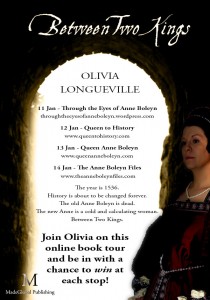
- 11 January – The Doomed romance of Anne Boleyn and Henry VIII at ThroughTheEyesofAnneBoleyn
- 12 January – Why are the Tudors so captivating? at QueentoHistory.com/
- 13 January – Anne Boleyn and King François I of France at QueenAnneBoleyn.com
- 14 January – Interview here!
Book Details
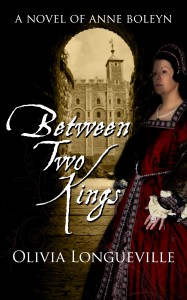 Anne Boleyn is accused of adultery and imprisoned in the Tower. The very next day she is due to be executed at the hand of a swordsman. Nothing can change the tragic outcome. England will have a new queen before the month is out. And yet…
Anne Boleyn is accused of adultery and imprisoned in the Tower. The very next day she is due to be executed at the hand of a swordsman. Nothing can change the tragic outcome. England will have a new queen before the month is out. And yet…
What if events conspired against Henry VIII and his plans to take a new wife? What if there were things that even Thomas Cromwell couldn’t control, things which would make it impossible for history to go to plan?
The year is 1536.
History is about to be changed forever.
The old Anne Boleyn is dead.
The new Anne is a cold and calculating woman.
Between Two Kings.
Olivia Longueville, author of Between Two Kings, has degrees in finance and general management from London Business School and currently helps her father run the family business. Olivia loves historical fiction and is passionate about historical research, genealogy, and art. She has undertaken in-depth research into the history of the Valois dynasty, the French Renaissance and the Tudors and Plantagenets. As an amateur historian, Olivia has chosen to explore her interests through fiction. Her most cherished dream has always been to re-imagine Anne Boleyn’s life, leading her to recreate the story of Anne with a twist – Anne taking revenge against those who wronged her and caused her downfall.
Between Two Kings is available as a paperback and kindle from Amazon.com, Amazon UK and to order from your usual bookshop (ISBN 978-8494457494).